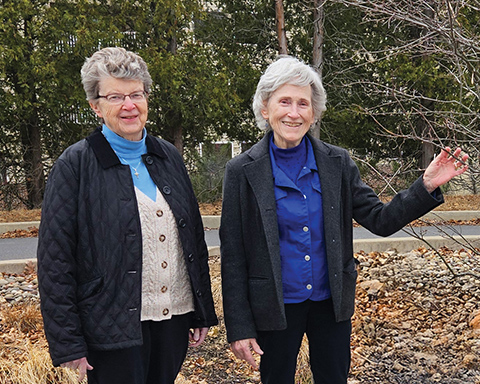Journey
A Stitch in Time Saves More Than Nine
Sister Chris explores a peace and justice perspective to living simply.
A Peace and Justice Perspective
Many years ago, a spiritual guide shared a profound observation with me. He noticed that when people were struggling with some inner soul work, they often began the growth process by first tending to something outside of themselves. Refinishing an old cabinet. Painting a room. Cleaning out a neglected file cabinet. Mending a piece of clothing.
I get that. I sometimes wonder if that’s the genesis of my attraction to thrift shops, where clothing that one person no longer finds useful is donated and reappears as a new neighbor in my closet. Thrifting is not only part of my effort to live simply but, if I’m being transparent, it’s also part of my desire to live simply and look good while doing it. Could it be that when the prospect of stretching the entrenched boundaries of my heart seems too overwhelming a task, I’m warming up for the necessary inner soul work by tackling what is exterior, what is seemingly more doable and less daunting? Perhaps. I like to imagine there could be an even more basic spiritual truth underneath.
That deeper meaning might be expressed in our profound desire to live lives of meaning so that our time on this earth, however long or brief, makes a difference for a world that is at once both beautiful and broken. The prophet Isaiah (Isaiah 58:6-12) describes this effort as the fasting the Holy One desires, a fasting that is not genuine unless we also reform our own way of life and work to ensure the flourishing of others. Isaiah challenges us to change social patterns so that the basic human needs of all people may be met. To release those bound unjustly. To share our bread with the hungry. To consider the well-being of every creature who will be affected by our daily choices. To notice what we pay attention to, how we spend our time, and what we buy. To reflect on the implications of our every action for the rest of our world, especially for our most vulnerable neighbors.
The Message Bible offers this contemporary translation of what happens when we embrace Isaiah’s understanding of fasting: “You’ll use the old rubble of past lives to build anew, rebuild the foundations from out of your past. You’ll be known as those who restore old ruins, rebuild and renovate, and make the community livable again.”1
“To make the community livable again” sounds so much like the Holy One’s dream of abundant life for all of us. To live simply is also to live justly, in the sense of tikkun olam, repairing and restoring the world through social action. The practice of tikkun olam calls us to love and care for our world through volunteering, donating, and advocating for social change.2
We may have noticed that in times of economic hardship, we’re more likely to return to older established practices that repair and restore our world. Making do with what we have. Fixing, rather than discarding something or buying a new replacement. Thrifting. Mending what is torn or worn.
I want to believe that this is what’s really underneath my practice of thrifting, which sometimes calls for mending with a stitch or two to repair a ragged seam or close a tiny hole. In “Spirituality of Mending,”3 Rev. Laura Everett calls mending an act of devotion. She notes that mending is a spiritual practice, an environmental commitment, and an act of resistance to the disposability of people and things. As she darns an old sock, she reflects that “this is what God is like. God is a mender. God takes what the world considers disposable, curls up in a large chair, and looks with patience to repair what is broken in each of us. God sees our tears and tenderly stitches us up.”4
As we work to embrace simple lifestyles, may we be moved by the image of each of us curled up in a comfy chair and nestled next to a loving God. This mending God gazes approvingly at the soul work we’re trying to embrace. This restoring God more than matches us stitch by stitch. This repairing God reads our weeping as a desire for wholeness for ourselves and others.
With the grace of the Holy One, may our way of living usher into being the words of Jan Richardson:
“From all that is broken,
let there be beauty.
From what is torn, jagged,
ripped, frayed,
let there be
not just mendings
but meetings unimagined.
May the God in whom
nothing is wasted
gather up every scrap,
every shred and shard,
and make of them
new paths,
doorways,
worlds.”5
May it be so!
1 THE MESSAGE: The Bible in Contemporary Language. Eugene H. Peterson, NAVPRESS, Colorado Springs, 2002.
2 “The World Is Broken, so Humans Must Repair It: The History and Evolution of Tikkun Olam.” Jonathan Krasner, The Jewish Experience, May 22, 2023. https://www.brandeis.edu/jewish-experience/history-culture/2023/may/tikkun-olam-history.html
3 “Spirituality of Mending,” Laura Everett, Religion News Service, April 12, 2019, https://religionnews.com/2019/04/10/the-spirituality-of-mending/.
4 Ibid.
5 In the Sanctuary of Women, Jan Richardson, Upper Room Books, Nashville, TN, 2010, p. 221. © Jan Richardson, janrichardson.com.



